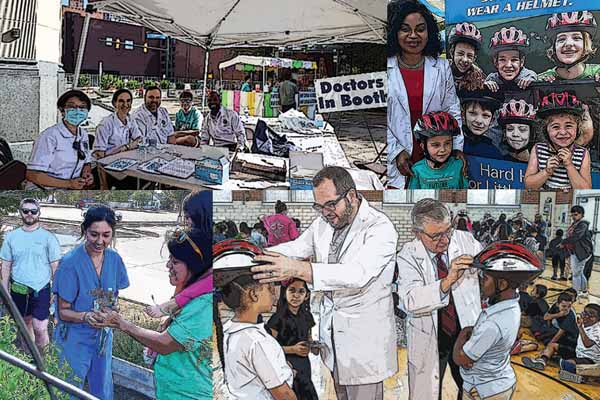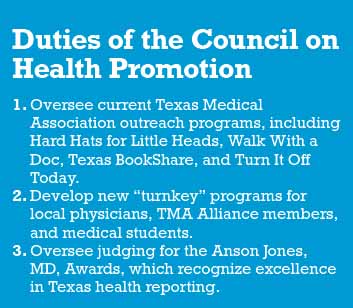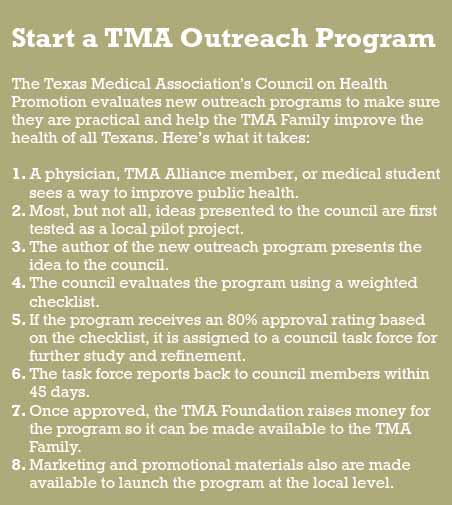
Few things feel better than when a plan to help other people falls into place.
That happened for Texas Medical Association Alliance President Libby White in 2010 when holding a Hard Hats for Little Heads event at a back-to-school fair in Lubbock. Hard Hats, which has given away 375,000 helmets to children since TMA launched it in 1994, encourages helmet use for all wheeled activities, including biking, skating, skateboarding, and riding a scooter.
“We had eight volunteers, and we were right beside the bicycle club, and we were all fitting helmets,” said Ms. White, whose husband is radiologist Steven White, MD. “It was like 20 kids deep, and they wanted that helmet so bad.”
That day was successful in part because Ms. White could tell how much the 100 or so kids who got helmets really loved them.
“I saw kids who were riding their bicycles with them on, and I thought, ‘That’s awesome – they’re using them,’” she said. “We could have given out 1,000 of them if we’d had them that day.”
Hard Hats for Little Heads is just one of several TMA-sponsored outreach programs designed to improve community health and make the House of Medicine more accessible to the public.
One way or another, all those programs tie back to the TMA Council on Health Promotion. It not only oversees existing programs but also helps identify and develop new ones that are effective and easy to carry out for county medical societies, alliance chapters, medical student groups, and medical practices, says Tyler family physician Li-Yu Mitchell, MD, who chairs the council.
“We do get oversight for these community programs, and we help provide the programming and framework that, in my view, lets physicians get back and help them connect with their patients and their communities in ways that you can’t do within the walls of a clinic or a hospital,” she said. “In many ways, this council supports and helps rekindle the why of what most of us become doctors for in the first place.”
The council is unique among TMA policymaking bodies in that it has voting members from TMA, the TMA Alliance, and the TMA Foundation. Among other things, the foundation provides grants that help local groups and volunteers pay for outreach programs. (See “Thanks to Program Funders,” below.)
Physicians, alliance members, and medical students can come up with ideas for programs easily enough because there is no shortage of need in public health, Dr. Mitchell says.
“There are these big-world health issues that we want to have an impact on,” she said. “Our hope with the council is to take these good intentions and come up with a project that is helpful for our docs.”
The trick is making the programs “turnkey,” or easy enough for anyone to do. That means finding ways to broaden their appeal so they are workable in different regions with different attitudes and resources.
“Doctors are very, very busy, and so we’re hoping to be able to develop turnkey programs that they can then incorporate into their own communities,” she said.

Experience matters
In 2006, the TMA House of Delegates created the council and charged it with “planning and overseeing programs and activities that enable TMA, TMA Alliance, and TMA Foundation to improve the health of all Texans.” The council’s other main task is to cultivate new outreach programs at the state and local levels.
Any physician can sit on the council, but council members frequently have direct experience with outreach programs in their areas, Dr. Mitchell says. That experience helps them spot opportunities in current practices and evaluate proposals for new programs.
“Probably the best-qualified people on our council to help are ones who have led programs in their own community so that they understand what it takes,” she said.
The most successful outreach programs include an element of fun, particularly because tackling public health issues often involves serious subjects tied to social problems or long-running health concerns like infectious disease or chronic disease, says Houston neurologist Eddie Lee Patton Jr., MD, who has been on the council for three years.
Outreach programs also benefit greatly from physician involvement, he says. The Walk With a Doc program does a great job of combining fun with physician input.
“People love it because you get to talk with a physician in a more relaxed setting when it’s walking around a park,” he said. “It’s less stressful [than a health care setting], and we practice what we preach. It’s one thing to tell patients to get out, but to actually walk with me puts some credibility to that.”
Flexibility also is important because the needs of each community vary, Dr. Mitchell says. That means outreach programs should be templates that permit creativity and variation.
For instance, Walk With a Doc typically requires at least 12 physician-led walks a year, but some communities make them weekly or vary the program in other ways. And the idea has gotten legs. Dr. Mitchell has used Walk With a Doc as the pattern for a non-TMA event for local elementary school children. Each Thursday, about 100 kids, 10 parents, and some teachers showed up to walk or run, listen to a speaker talk on a health topic, and get a healthy snack. About two-thirds of the kids came from low-income homes, and often this was the only physical activity they got outside of school.

Where to begin
Every successful program starts with an “a-ha” moment when a physician, alliance member, or medical student recognizes a public health need and sees a way for physicians to address it outside the clinic, says Lubbock radiologist Eman Attaya, MD, immediate past chair of the Council on Health Promotion. The question people often have is – what do I do next?
As with most policy changes in TMA, creating a turnkey outreach program starts at the local level, she says. The best first step is to get in touch with a county medical society and look for ways to get the program going locally. Some county societies, like hers in Lubbock County, have committees that specifically review those projects, while others have less formal processes.
“I know a lot of physicians are [unhappy] about the situation of health care, and the way to make a change is to get involved,” she said. “These programs are an example of how you can make a change.”
Anyone proposing an outreach program also needs to do research on the subject with an eye toward creating a pilot program – something that can be done on a small scale to see if there’s a need and how best to address it, says Ms. White, also a member of the council. It’s also important to find out what local resources are available for volunteers, material, and financing.
“You identify the need and then figure out how to fix it,” she said. “And it’s through the connections you already have in the community, or it’s as simple as just awareness.”
Some programs remain local because they’re more suited to local needs. For instance, the Lubbock County Medical Society created a program designed to raise public awareness about human trafficking, in part because that problem is so serious in West Texas, Ms. White says.
“By being president of the state alliance and visiting the different counties, I’ve seen firsthand that each county has uniquely different needs,” she said.
But others have more universal appeal and can more easily translate into broader acceptance. For instance, in 2021 the TMA Alliance used a grant from the TMA Foundation to start its Texas BookShare program, which promotes literacy and provides families in underserved areas with stories about how to live a healthy life. As of late February, the program was running in seven counties.
Even the best outreach programs can pose practical problems for volunteers to solve, Ms. White says. Hard Hats requires volunteers to learn how to accurately fit helmets on children’s heads so that they’re safe and snug. Walk With a Doc requires volunteers to line up already busy physicians to be able to make the walks on a regular basis.
Regardless, TMA provides many resources designed to help physicians and other volunteers easily overcome those obstacles and put on a great event, Dr. Attaya says.
“The Council on Health Promotion is giving us a bigger scope to affect the health of Texans,” she said.
